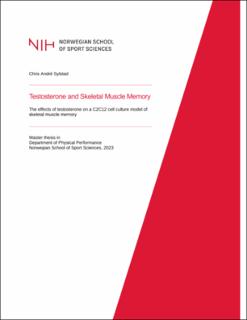| dc.description.abstract | Introduction: Testosterone is vital for skeletal muscle (SkM) development and exhibits a dose-response relationship with muscle characteristics. However, the underlying molecular mechanisms are not fully understood. Recent studies on SkM memory, in the context of resistance training, have identified myonuclear permanence and epigenetic methylation as key mechanisms. Given similarities between testosterone and resistance training outcomes, it is plausible that that testosterone may influence SkM memory, with implications for hormone replacement strategies, anti-doping regulations, age-related muscle decline, and our understanding of testosterone mechanisms.
Purpose: To investigate the effects of repeated testosterone treatment on SkM memory using a C2C12 cell culture model.
Method: C2C12 myoblast cells were subjected to six treatment conditions: Control, early, two late, and two repeated treatments (memory), receiving a supraphysiological testosterone dose at specific time-points after myotube differentiation. Morphological imaging, fixation for myonucleic counting, RNA for PCR analysis (Androgen receptor (AR), myosin heavy chains/MHC I, 2, 4, and 7 genes), and DNA for methylation analysis were collected.
Results: Myotube numbers remained unchanged across conditions and time. Treated conditions showed a significant increase in myotube diameter and area compared to control. Memory conditions had a greater increase in diameter than single treated conditions. The repeated treatments with testosterone availability exhibited greater myotube area than all other conditions. Moreover, also exhibiting larger myobranches than nearly all other conditions. No significant differences in gene expression were observed for any condition. Memory conditions tended to deviate non-significantly from all other conditions. AR gene remained unchanged, but repeated treatment tended for reduced expression in memory conditions. Fast twitch MHC isoforms exhibited gradual increases, with less pronounced increase in repeated treatments. Slow twitch MyHC isoforms tended for increase expression on day 3 for early single treatment, plateauing by day 7 and 10, while memory conditions exhibited a decreasing trend. Conclusion: Testosterone augment C2C12 hypertrophy, with repeated treatment resulting in additional hypertrophy provided testosterone availability, with evidence of memory effects within myotube diameter and area. Single-dose testosterone minimally affected gene expression, while repeated treatment showed non-significant reduction in AR gene expression, slow twitch MyHC isoform, and less pronounced increases in fast twitch MyHC isoforms. These findings suggest saturation of ARs and a shift in cell priorities to non-traditional actions due to repeated testosterone treatment. | en_US |
